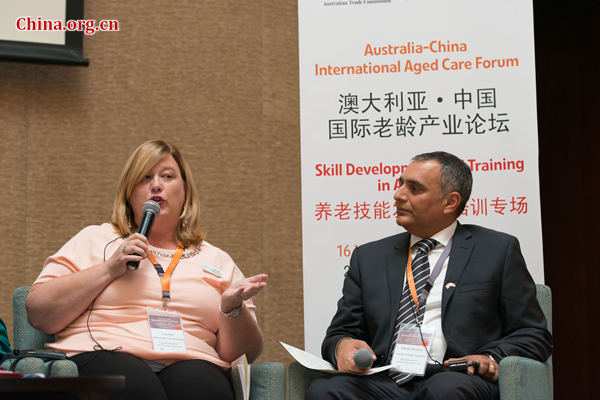China, Australia seek common market in senior care
- By Chen Boyuan
 0 Comment(s)
0 Comment(s) Print
Print E-mail China.org.cn, November 17, 2015
E-mail China.org.cn, November 17, 2015
 |
|
Representatives of Australian senior-care industry introduces their companies to Chinese partners at the first Australia-China International Aged Care Forum on Monday in Beijing. [Photo by Chen Boyuan / China.org.cn] |
Industrial and educational professionals in senior care from China and Australia have met in Beijing for the first Australia-China International Aged Care Forum in a common bid to promote the sector in China and gain common profit.
The forum, designed to bring the best features of the Australian senior care industry to the Chinese market, came at a time when China's population is aging at an accelerated speed, prompting the country to lift the ban on more than one child in most families.
The United Nations standard categorized China as an "aged society" as early as 2000. By 2013, there were 202.43 million people aged 60 and above, an increase of 8.53 million year on year. People in this age group accounted for nearly 15 percent of the country's entire population.
This is creating huge market demand for senior care. Australia has a well-developed, wide-range industry handling senior care, following development spread over more than six decades, said Michael Clifton, minister and senior trade commissioner of the Australian embassy in Beijing.
"China is facing a gap of 13 million workers in the aged care sector, with only one million people trained or enrolled in courses to help bridge that gap," said Clifton, quoting a recent report published by Peking University.
He expected the growing cooperation will equip Australian companies with "a level of awareness and understanding of the market opportunities," offering fruitful opportunities to Australian and Chinese companies in partnership.
More than 130 representatives from over 70 Australian companies attended the forum, showing how the senior care sector in Australia is willing to cooperate with China, apart from the "huge market" involved, noted Liu Chuyang, trade commissioner at the Australian embassy.
Compared to the purchase of advanced senior care facilities among other "tangible products," improvement of actual senior care skills often tends to lag behind, according to industrial experts of both countries.
"Young people aren't willing to enter this profession because senior care including nursing is dogged by a stereotypical idea that it is a lower-end job that does not require much education." said Dr. Wu Danxing, dean of the Institute of Health Industry at the Beijing Geely University.
She said that although a nursing major does exist both in vocational institutes and in universities, students are almost solely trained to be nurses in hospitals rather than nursing homes; upon graduation, they do have adequate medical knowledge to attend normal patients, but not necessarily to take care of older people. Meanwhile, the so-called "nursing workers," people who work in nursing homes, lack proper training.
"Providing necessary training, and even opening a higher educational disciplinary on senior care is also something that experts from both countries can work on," she said.






Go to Forum >>0 Comment(s)